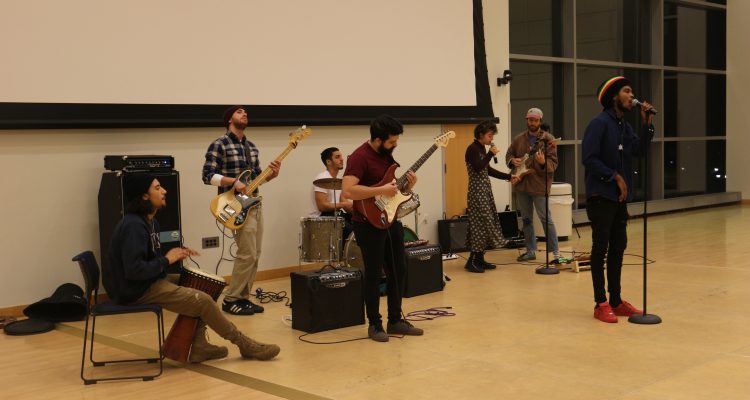By Daniela Doncel
“Why Reggae? Why is this the best genre to convey your message?”
“Reggae for me is everything. Not even just growing up into it, but the sense of what the music is about and what kind of vibe it actually puts out into the world that people can relate to. It’s like anyone from a baby or someone old enough can really take it and understand it, and it’s in a positive light,” Prince Royal, the lead singer of reggae band Souls of Zion says.
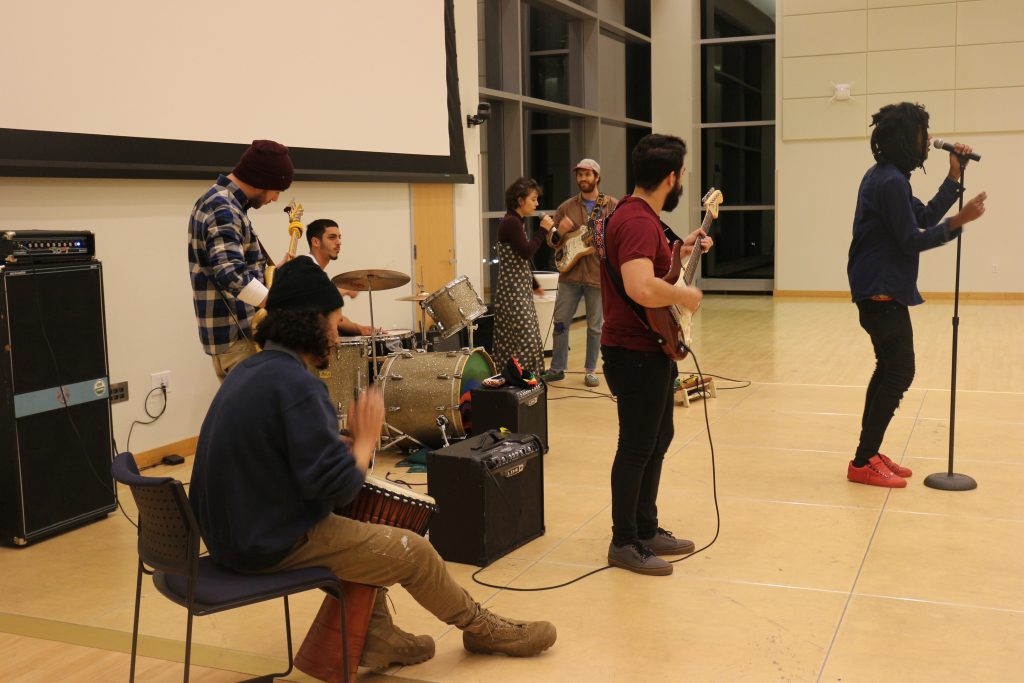
Souls of Zion performs for the Fall Showcase of Alima, an international dance association, at the University of Connecticut. Parchi Shah, the MC of the event, said, “This year, we didn’t want the energy of the show to die down during intermission, and we know Souls of Zion has a lot of energy, a lot of enthusiasm, and they just have good sound, so we chose them to keep everyone’s energy up.” Photo: Daniela Doncel
Royal has been the lead singer for Souls of Zion for about two years, but music has been a part of his life since his early childhood.
“My dad was in the music industry in Jamaica when I was growing up. When I was like really young, when I was like seven or eight, my dad wrote me my first song and he had me sing it. Then one day he kind of forced me to sing on a stage,” Royal says.
Royal did not begin to take music seriously until later on in school when he would sing in the school choir and write poems that eventually became sources of inspiration for recording music.
Souls of Zion began as an idea of individuals coming together to express thoughts and ideas through song. The band, comprised of a lead singer, one to two guitarists, two drummers, and occasional back-up singers, is now the sound behind the album Mental Revolution with a message for all who listen.
“Souls of Zion, to me, is souls of wherever your happy place is, or your dream place, or your promise land is or heaven, how you describe that,” Royal says.
“To me, everyone is a soul of Zion and we all have a promise place or a place that we would consider to be better or ideal in our minds and whatever version that is, it exists in some fashion,” Merchant says.
Conor Merchant is a drummer for the band.
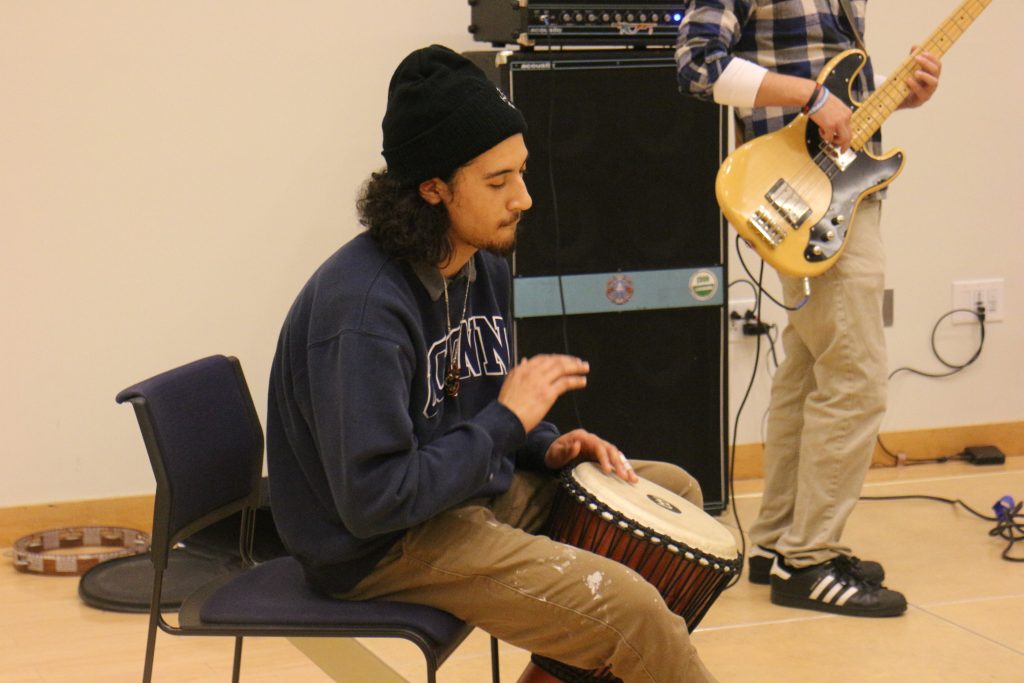
Conor Merchant plays the djembe with Souls of Zion at the Alima Fall Showcase at the University of Connecticut Student Union. Photo: Daniela Doncel
“It’s manifested into a place, but it’s really an ideal kingdom,” Merchant says.
Though Merchant had been friends with Royal long before Souls of Zion, Merchant first played with him at a festival show. Merchant had been playing for about an hour when Royal joined him. Soon enough, a DJ joined, a crowd of festival-goers, and Fox 61 News cameras surrounded them to listen to the music.
“I just bought the drum the day before, went to the place, sat in a chair and started drumming. The difference between great ideas and greatness is action. That day, we took the action and it just manifested since then,” Merchant says.
Merchant is a senior at the University of Connecticut, studying anthropology and human rights. He lives off campus with no car which is an inconvenience when it comes to transporting his heavy drums for performances and practices. Regardless, Merchant says he is willing to make the trek for he enjoys playing with the band.
Royal worked on the album’s chord progressions, lyrics and rhythms for upwards of four months.
Each member of the band immersed themselves in the world of reggae to familiarize themselves with the genre’s community impact through media such as the documentary by Jerry Stein named Word, Sound and Power.
Reggae originates from the island of Jamaica and is historically known for being a musical voice for the poor and oppressed. By the 1970’s, the genre became internationally popular in Britain, the United States and Africa.
The band recorded the album’s music on a reel-to-reel tape recorder at the Blind Moose Studio in Bloomfield, CT. The album, though performed by Souls of Zion, is credited to Royal due to his record deal with VPAL Music.
Royal says the album’s message involves awareness of the world we are living in.
“With a lot of stuff happening online and people not going outside into the physical world and a lot of things are happening. A lot of politics, arguments and fights and bullies, they’re all happening on a social media sense. It’s getting everyone into a mental mind set that these things are going on in the world, regardless if you’re out there to see it, like it’s happening,” Royal says.
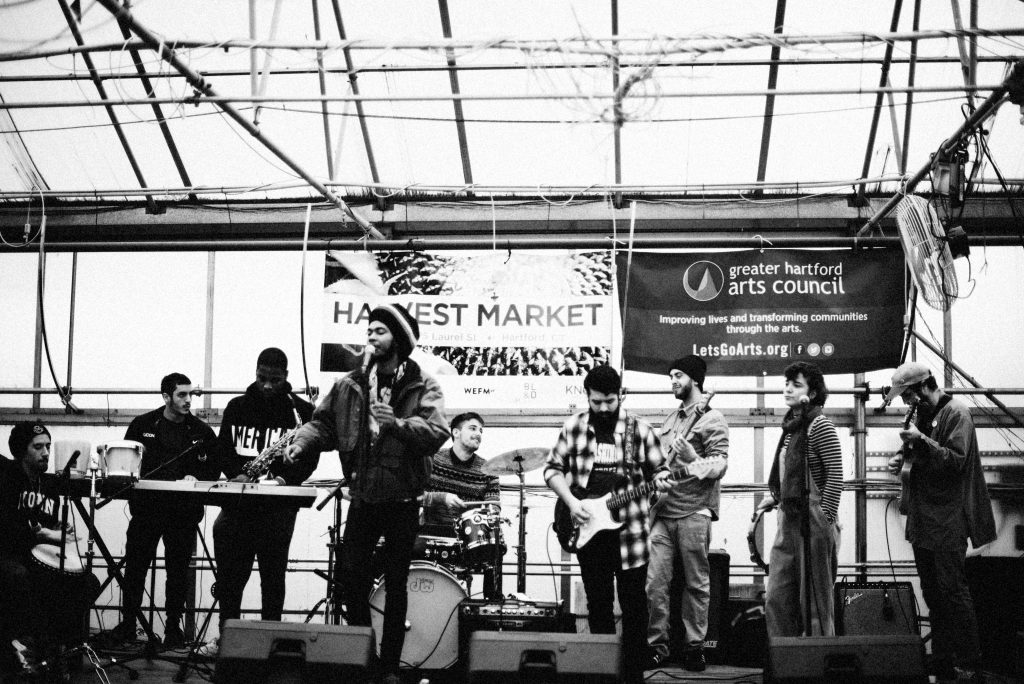
Souls of Zion performs at the Harvest Market in Hartford. Photo: chad b. springer
Merchant says the content of their lyrics and the heartbeat rhythm sends out a positive energy that is needed in the world.
“I think people have to wake up, and this is where the mental revolution part comes in, and realize that they are agents in the world. No matter who you are, you have to be engaged,” Merchant says.
The overall goal of the band, according to Merchant, is not just to spread positivity with music but to spread their message to listeners. The message being to realize the world we are living in, how we are a part of it and what we can do about the problems that are going on in the world and in the community.
“You don’t have to go a million miles to fix somebody else’s problem that you don’t know anything about. There are people in your town that are probably hungry tonight, so realize that when you’re walking past a homeless man. Or just say that you’re going to wake up and have a good day to try to do the best that you can. If that’s hard for some people, that’s a struggle they have to live, so that’s their war that they’re fighting, and to come to that realization,” Merchant says.
For the members of Souls of Zion, it’s important to present their content without obscenity, vulgarity or malice intent, because to them, the youth deserve respectable content to live by.
“Kids are exposed to certain things at an early age, like I have a younger sister, and you know, there’s certain things that are exposed on even TV that I hear that’s kind of too much to even be on TV that I would think. My music, I want everyone to be able to listen to it and understand it and like it,” Royal says.
“You know, I look around and I just see everyone in the groove.The sound of the music, the kind of vibe people are on. It’s just such a great feeling. It’s like an exchange of energy from everyone listening to us and vice versa,” Royal says.
Royal has performed in Connecticut, New York City, Washington D.C., Atlanta, Georgia and Jamaica.
According to recent UConn graduate and bass player for the band, Stew Henderson, performing with the band has been a musical learning experience.
“Above all, it’s about the feel. It’s not about squeezing as many notes as you can and it’s not about really anything besides the feel. The feeling is just as important if not more important than the actual notes you’re playing,” Henderson says.
For Merchant, his role as drummer is a fundamental part of the music the band performs. According to him, the percussion is essential to the rhythm, beat and dynamic of the music.
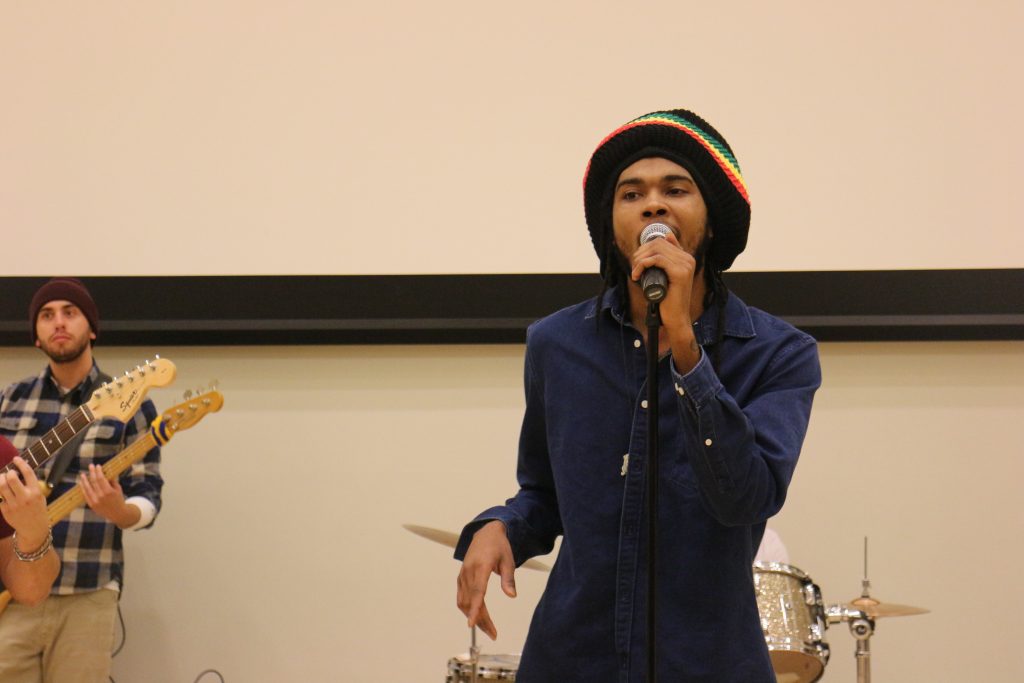
Prince Royal sings one of the band’s songs at the Alima Fall Showcase. Photo: Daniela Doncel
“Playing, I can look up and keep a nice rhythm, and I’ll be watching our other band mates, literally what notes their playing, waiting for cues and go, and look back into the crowd and literally see people in ultimate form dancing, no care. Like the type of dancing where you are flailing your arms and flying, eyes closed, probably dancing with a partner. I have seen people just like come, someone like ‘You wanna dance?’ ‘Yes,’ and they have an amazing time, and that for, me, is such satisfaction. I get satisfaction while playing,” Merchant says.
Royal says the future of Souls of Zion involves making quality content and to touch as many people as possible with their lyrics.
“Music brings people together. That’s the biggest lesson of being on stage. The energy I’m putting out is what people receive and they’ll give back,” Royal says.


